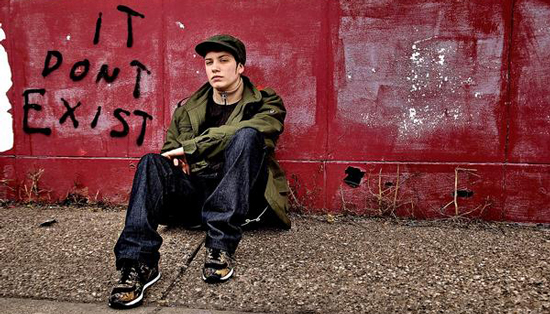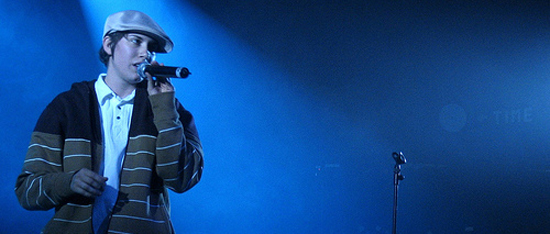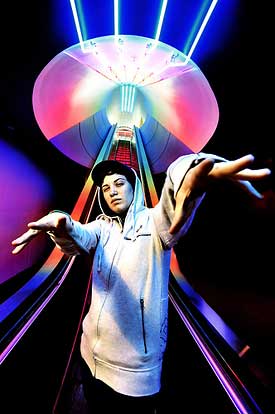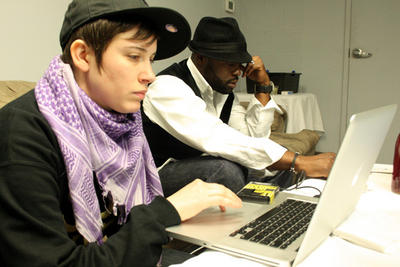Audible Hype Loves Invincible (And So Should You)
Posted by Justin Boland on Jul 22, 2009 | 0 Comments

First things first: if you’re not already familiar with Invincible’s music…start now. Here’s the obligatory Myspace link, and here’s her (amazingly good) album, Shapeshifters. If you’d like to know more about her personal story and activist background, check out this recent article from the Metro Times.
The Story Behind Emergence.
Source: Art of Rhyme
So what prompted you to start Emergence?
Invincible: That’s a long story. I don’t know where to start [Laughs]. Basically when I was fifteen I started doing shows. Obviously I was young and impressionable. All these labels were coming to me trying to sell me dreams. I was able to see through it because I was around some people that were independent. I came up with an independent emcee who’s on my album named S.U.N. He had a label (Black Soul on Vinyl) so I already knew what was up, but I didn’t know how to approach putting it out myself. I kept looking into those deals and when I moved to New York I had even more people pursuing me. It got to the point I turned down so many deals that XXL called me “every A&R’S worst nightmare” or something to that effect. It was a whole feature piece on how I was ungrateful for not signing all these wack deals that were coming my way. It was a compliment for me because these A&R’s sell people short on a regular basis.
After I moved back to Detroit I connected with Waajeed of bling47 and Underground Resistance. I learned from bling47 and Underground Resistance how to approach being an independent artist. That’s what kind of helped me start Emergence up. Waajeed basically sat me down and was like I’m going to pay you for this record we recorded, but I really want you to spend the money getting your own studio set up. I went and got that laptop pro tools setup and started recording the album from that point. I got together with some friends and just brainstormed how I could put it out. The concept wasn’t just to put myself out, but to put out a model for other artists to put himself or herself out. I’m not out to make Emergence the Detroit Def Jam. I’m trying to create a model cats can sign themselves.
Do you teach that aspect in your workshop also? How to create an independent label?
Invincible: Not yet. I’m still taking that workshop. [Laughs] I’m learning as I go. I’m making a path while I’m walking. I would definitely like to be able to do that in the future. Any type of tools I can share from my experiences. There are so many incredible artists around me; they just don’t know how to go about it step by step.
Paying Dues and Being Honest

Source: Michigan Hip Hop
Invincible: I want to create a whole manual with how to do this sometime down the line”¦but basically I sat down with my homie Wes from Athletic Mic League, and we created a business plan. I went around with it looking for investors, and then when some situations fell through, I just self-pressed up the “Sledgehammer” single and started promoting the project. After that, me and my homegirl Jenny from Detroit Summer were brainstorming alternative funding methods and came up with the presale voucher idea, to get the listeners and community to “invest” in the project. I also wrote up a whole statement on how I wanted to connect fair trade and cooperative economics with Hip Hop through how I released the project. My friend Mike from Detroit Summer loved that concept and came on board as a partner. We started EMERGENCE as an official LLC and went about the steps of post-production, manufacturing, promotion, and touring that we felt matched the ethics of the music itself.
As you said earlier, you’ve gained a reputation as an “A&R’s worst nightmare.” What was that like for you as all that was going on?
Invincible: As a young artist coming up, you just have this ideal in your mind for all your music to get heard on a large scale, and I want longevity. The majority of the deals that were coming at me were focused on reaching a lot of people, but in a way that was going to ruin my potential to grow as an artist. You walk in a room, and somebody’s like, before they even want to hear your music, “What’s your marketing scheme?” Basically, they want to hear that first.
It was moreso about how they’re going to put you in a box. And someone like myself, in some ways, my gimmick is not having a gimmick. I just make good music, and I stay true to the shit I talk about. The shit I talk about is what I do. So that’s not the most marketable thing in the world, and the things they were trying to market me off as I weren’t really feeling, so at some points I was just like, “Fuck this: I’ll make music for the love of making music, and continue to do work with the youth and all the other stuff that I do.” For me, the independent route has always been something I thought would be the ideal situation. I just didn’t know the steps to make it happen.
Now that I’m able to create my own label EMERGENCE, I’m learning every step of the process, from beginning to end. What I wanted to do with EMERGENCE is really create a manual, or at least a model, for other artists who are interested in signing themselves to be able to do that. I’m not out here trying to sign everybody; I’m trying to get people to sign themselves and create something that’s a viable option for people, so they don’t feel like, “I’ve got to sign this rap deal or I may not have another chance.” That’s what people always tell you, but in reality, you turning down those deals could create a better opportunity for you to put something out independently, or get another situation that’s more conducive to you as an artist. My thing is being able to show that this route is doable, and it can be successful, and it can be a better alternative than signing your life away to somebody who just might put you on the shelf. Nine times out of ten, if you know how the industry works, you know that you’re better off starting independent. If you don’t stay independent, at least start out that way, so that you have a foundation for yourself.
Fan Financing: The Making of Shapeshifters
 Source: Detroit Fusicology
Source: Detroit Fusicology
“Mad Mike from Underground Resistance once told me that you have to be as creative and intentional with how you manufacture, market, and release your music as you are with the music itself. That really stuck with me, and Submerge/UR is a huge influence on EMERGENCE’s approach.
By giving out the “Sledgehammer!”Â/”ÂIn the Mourning”Â/”ÂLoongawaited” singles for FREE I was able to get people’s attention and let them know that the project was FORREAL coming out this time, since I’ve had so many false starts in the past. Through the EMERGENCEmusic.net download I was able to collect contact info so that my relationship with people who listen can be more direct.
I’ve also created hand silk screened pre-sale vouchers for the album, available at shows and on the site’s store. Those who buy the voucher are essentially investing into the pressing of the album, and into the growth of my music as a whole. One of the quotes off of the song “Looongawaited” is: “You want good music? You gotta support it.” And by saying this, I mean that artists are part of a larger community, and if we want those artists to represent our community, we have to support them on many levels, otherwise they will be less accountable to us and more beholden to the labels and disconnected entities that cut their checks.
Writing, Creating, Critiquing

Source: Hip Hop Core
You worked as a writer for the Lyricist Lounge in New-York. Can you tell us a bit more about that experience?
Invincible: We wrote and shot the show in LA for both seasons. It was an intensive writing process (we worked around the clock) and I learned a lot from all my co-workers (including Wordsworth, Mos Def, Thirstin Howl III, Bareda, Abnormal, and more), about their various writing and creative processes. I met several favorite artists of mine when they guest starred on that show (Qtip, Tash, Erykah Badu, Cee-Lo, Da Brat, and more). Other than that I hated working for MTV because they regularly censored and tampered with the show’s content, saying it was “too black, too hip hop” etc. The whole experience really confirmed that the corporate industry route was not for me.
You’ve been known to say that you’re your worst critic. Which would you say you’re most critical of : content, technique or the beats?
Invincible: A friend once told me you can say whatever you wanna say content wise, and people will listen to you whether they agree or disagree, as long as the delivery is convincing and the flow is sick. I would add that they listen even more if the wordplay, rhyme scheme, and word placement are intricate, the punchlines are clever, and the imagery is vivid. Of course I’m always reflecting on my content and I would love to gain more production skills even if just to add layers and arrangement to my pieces. But honestly the part that is most important to me above any technique beat or content, is finding my “inner voice”, and developing a way to emcee that expresses in ways that only i can convey, and through that act I hope to create spaces and inspiration for other people find their voices as well.
